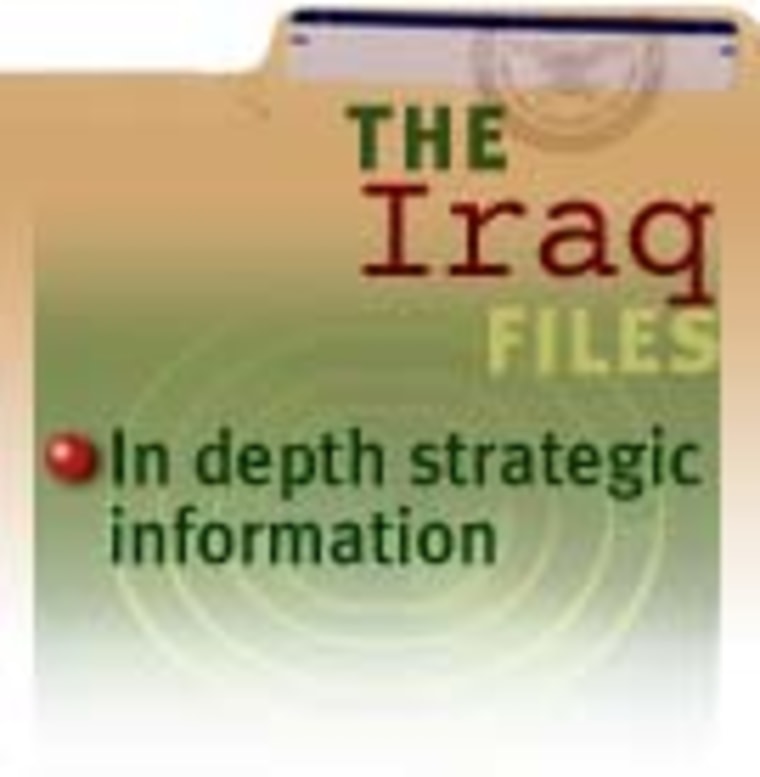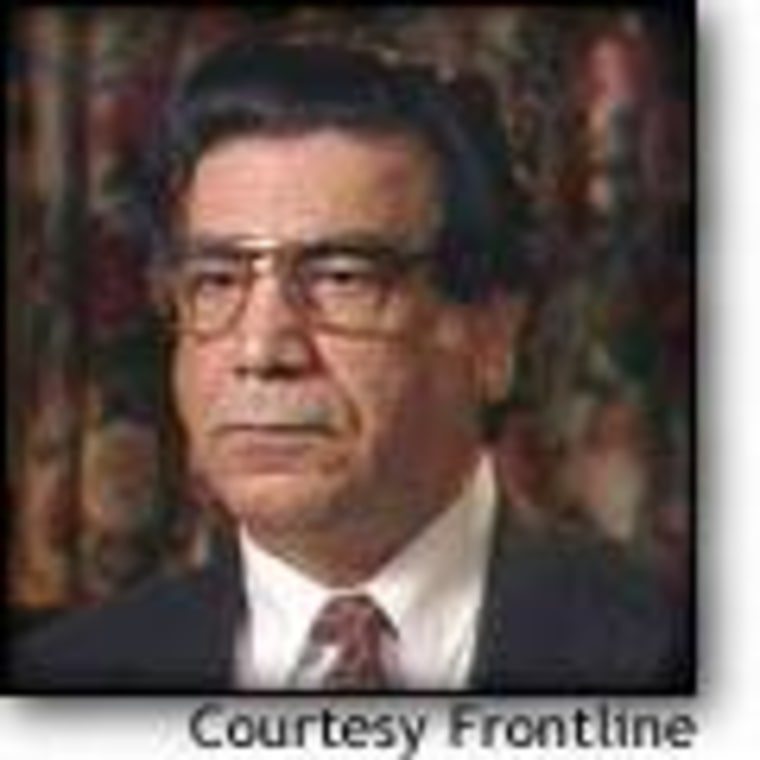Khidhir Hamza is a rarity: a high-level Iraqi defector with an insider’s knowledge of Saddam Hussein’s weapons capabilities. As he detailed in his autobiography from last year, “Saddam’s Bombmaker (with Jeff Stein),” Hamza was the overseer of Iraq’s nuclear weapons program. In the 1960’s, he studied nuclear physics at MIT and Florida State University but was forced to return to Baghdad in the early 70s when the Iraqi government made thinly-veiled threats against his parents.

HE SPENT THE NEXT 20 years enduring nightmarish outbursts from Hussein, who once forced him to watch a videotape of colleagues who had supposedly betrayed the regime being shot to death by a firing squad. By 1994, he’d seen enough, and fled Iraq before making his way to the American embassy in Budapest, Hungary. Hamza, who now lives in hiding somewhere in Virginia with his wife and children, recently spoke with NEWSWEEK’S Suzanne Smalley about the two decades he spent developing deadly weapons.
NEWSWEEK: What was it like working under Saddam Hussein? In your book you talk about colleagues who dared to challenge his authority being tortured and killed. How did his mind seem to work?
Khidhir Hamza: He is a man who came to power through murder and intimidation. Talking to him you feel this immediately. He talks in a transparently dismissive and haughty manner. He is literally a bully in private. In public, especially on TV, he is the gracious and smiling father figure. But the worst part of dealing with him is getting him angry.
Do you believe that Hussein is helping to finance Al Qaeda? Did any of your experiences in Iraq give you reason to believe that Hussein has ties to bin Laden operatives?

When I left Iraq in 1994, bin Laden was not on the world’s radar yet and there was no reason for me to hear about him. But knowing Saddam, it would be the perfect organization for him to support. There were sightings of bin Laden in Baghdad...before the African Embassy bombings in 1998. Recent Iraqi defectors do confirm training foreign Islamic fundamentalists.
You were educated at MIT and Florida State and then forced to return to Iraq to make an atomic weapon. Were any of the other 12,000 people you worked with making the bomb also educated in the West? Did your colleagues and you ever comment on the irony of the way your education was being channeled against the countries that had hosted you?
It was not meant to go against the U.S. or the West. We started with a modest program to achieve strategic parity with Israel. But Saddam had other ideas. When they became clear at the onset of the Gulf War we gave up. It took me three years to plan an escape without immediately jeopardizing my family’s safety.
The problem for the scientists was that we were not sure of the reception we would get if we attempted defection. Muayad Naji attempted defecting to the U.S. in 1993. He escaped to Jordan with his family. Denied a visa by the U.S. embassy, he was trying to find a country to accept him. This gave enough time for Iraqi intelligence to arrange a hit on him. He was murdered in front of his family by two Iraqi agents in one of Amman’s major streets. To compound the terror, the murderers were released by the Jordanian government on a promise of a trial in Iraq. A year later when I left, I was denied a visa despite the fact that the head of the Iraqi opposition vouched for me. It took another year and a harrowing time for my family before the U.S. agreed to help. Not a single major scientist in the military program managed to escape after my experience. Dr. Nasser Hindawi, the real brain behind the bio-warfare program [and educated in the U.S.] , is still languishing in jail because of an attempt to escape.
What about the U.N. weapons inspections? Were they a farce?
Actually the inspectors did a good job of uncovering the Iraqi weapons of mass destruction, despite many lapses initially. However, the mandate they were under limited their scope. Monitoring the knowledge base was not within [the UN’s] scope. When I left, I was surprised by how little follow-up they had on the scientists. It was remedied to a degree later, but it was too late. The long process alerted Saddam and he kept the scientists mostly out of reach. Later he kicked the inspectors out to preserve what he had and to have more room to rebuild his weapons program. If you know what to do, equipment is replaceable. For Saddam, who has a very extensive purchasing network all over the world, this is especially easy. Also, Iraq has good knowledge in manufacturing some of the major pieces of equipment, including fermenters for the bio-warfare program.
How did Saddam view America’s dependence on oil and what did he think it could do for him?
The invasion of Kuwait was meant to control the Gulf oil. This is the next step in the danger Saddam presents the region. If he nuclearizes his forces he will be invincible to attempts to remove him from power. This will encourage him to terrorize the region the way he did before the Gulf War. His invasion of Kuwait was based on the claim that it flooded the world market with cheap oil and thus damaged Iraq’s oil income. [The U.S.] did not take him seriously then, but when he is back fully weaponized, this time they will.
You believe that with some Russian brainpower Hussein could go nuclear. Were there any Russian scientists working with you in Baghdad? Do you think the West would know if Hussein had nuclear capabilities?
Russians worked in the chemical weapons program but until I left there were no Russians in the nuclear program. However, I describe in my book how the Russian scientists were desperate for work when I visited Russia in 1990. Iraq did use a German engineer to help in the uranium enrichment program in the late 80’s. If Russian scientists are employed, Iraq can cut considerably the time needed to produce bomb grade uranium in large quantities. I have no direct knowledge that this is happening now but I think this is a logical move that Iraq was considering for sometime. Saddam may choose to detonate one [a nuclear weapon]. This will make him an instant hero in the Arab and Muslim world. And it will also provide him with the deterrence he needs to have more of a free hand in the region.
You say that if the embargo were lifted, as Russia, China, and France have pushed for, Saddam could easily “cross the nuclear bomb finish line.” Could you explain the correlation?
Lifting of the sanctions will allow Iraq to trade more or less freely with the outside world. It will also allow Iraq to control and keep the revenues of its oil sales. Most of the nuclear weapons components and support structure can be achieved with conventional engineering and dual use equipment. With open borders and large revenues these are easily obtained. Thus, Iraq will be able not only to produce the three bombs that German intelligence estimates it will have in 2005, but a much accelerated rate of production and eventually full nuclear status at least as large as that of India and Pakistan.
The bomb program employed more than 2,000 engineers, 300 of whom held Ph.D.s in the hard sciences. Were they all Iraqi? What percentage were educated in the West?
All of the leaders of the Iraqi nuclear program are trained in the West.
You write that Hussein was very close to having atomic capability when you defected. Do you think he could have achieved it by now? Can you convey how close he was in terms that the average person would understand?
The German BND [intelligence network] accumulated a very thorough analysis of the Iraqi nuclear weapons program. They used information from various sources including defectors and aerial and satellite surveillance. Their report, which was published last December, estimates that Iraq will possess three nuclear weapons by 2005. This is assuming that Iraq will use only existing uranium stockpiles and no foreign input. Iraq already had a workable nuclear design when I left. A minor enrichment capability is all that is needed to provide the nuclear core for three weapons.
How far do you think Hussein would go to punish America? How mentally unstable did he seem to you?
America did the one unforgivable sin with Saddam. It humiliated him but kept him in power. It is like playing with a highly poisonous snake. Keeping it hungry and confined but alive waiting for a chance to strike back. There was a serious misunderstanding of his stamina and ability to survive. But one thing about Saddam is clear to all those who know him: He never forgives and never forgets. Remember the attempt on former President Bush during a visit to Kuwait? He was no longer in office, but Saddam could not let go. Also, the murder of his two sons-in-law despite his personal promise of forgiving and forgetting if they came back from Jordan. He could do neither. His two daughters are still under house arrest the last we heard. If Saddam can unleash any disease in the U.S. with deniability, my guess is that he will not hesitate for one minute. I don’t think that he is suicidal or mad. He is calculating and determined and evil. But under pressure he can go into a rage.
© 2003 Newsweek, Inc.